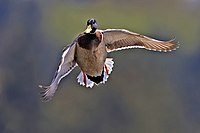Two-day bird flu conference draws $1.9 billion in pledges
Thursday, January 19, 2006
In Beijing, China, 1.9 billion US dollars in pledges came from 33 countries and a host of multilateral institutions at the end of a meet co-ordinated by the World Bank. The amount exceeded the organization's estimate of $1.2 billion to $1.4 billion in funds required to contain the avian flu over the next three years. In addition to aiding research efforts, the money is expected to help strengthen surveillance and increase the stockpiling of surgical masks and other equipment.
The United States was the largest donor, pledging $334 million in grants. Japan pledged $159 million while the European Union pledged $120 million. The EU member nations promised an additional $138 million.
China which is home to a third of the entire world's population of birds pledged $10 million to help other countries with the effort. Jia Youling, China's chief veterinary official defended the relatively small pledge claiming that China was still a developing country and faced a serious challenge from bird flu within its borders. Premier Wen Jiabao personally attended the conference and announced that the country would share more information on outbreaks in the country, including samples that will assist in tracing genetic changes.
Dr. Lee Jong-wook, the director general of the World Health Organization, believes that the Chinese government was fully committed to sharing information openly and freely about bird flu cases. But he cautions that it would be difficult to stay fully informed about every health development in a country as populous as China.
Dr. Lee also expressed his concern about reports that children in Turkey have now become infected with the A(H5N1) avian influenza virus without becoming ill. Some studies suggest that the disease must become less lethal before it can cause a global epidemic, he noted. There is concern that patients may continue to infect more people by going through their daily routines if the flu symptoms remain mild.
Some scientists note that the avian flu has been known to occur among poultry in southern China since at least 1996. They are encouraged that the avian flu virus has failed to evolved into a form that is transmittable by people in all this time. This could be an indication that this would never happen. But others including officials from the United Nations Food and Agriculture Organization disagree claiming that increased contact between infected poultry and people raises the odds that the virus may eventually adapt better for transmission among humans.
Sources
edit- Jason Gale, Lee Spears. "World Leaders Pledge $1.9 Billion for Bird Flu Fight" — Bloomberg.com, January 18, 2006
- Keith Bradsher. "Conference on Bird Flu Draws Pledges of $1.9 Billion" — The New York Times, January 18, 2006
- Keith Bradsher. "$1.9 billion pledged for fight against avian flu" — International Herald Tribune, January 18,2006
